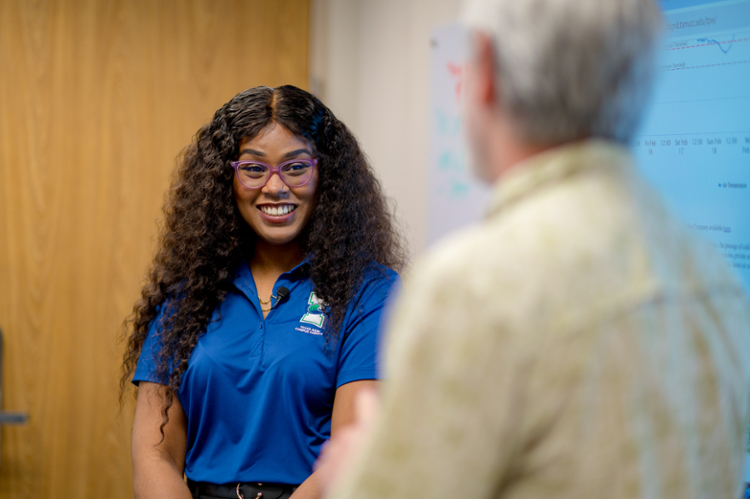Islander Students Develop Software for Texas State Aquarium to Improve Sea Turtle Rescue
CORPUS CHRISTI, Texas – While winter weather calls for mugs of hot cocoa and curling up to the latest Netflix series, it may also lead to negative impacts on the ecosystem. For example, extreme water temperature can cause cold-stunning sea turtle events, which exposes sea turtles to life-threatening risks such as being stranded, entangled, or injured.
In 2018, so far, more than 1,100 sea turtles have been admitted to Texas State Aquarium’s (TSA) Wildlife Rescue Center. As each sea turtle is brought in for treatment, measurements like their body weight and temperature are carefully documented for use in national databases.
To make that record-keeping task more efficient for TSA rescuers, students from Texas A&M University-Corpus Christi’s College of Business worked with TSA’s Animal Care and Management Information Systems staff to develop an application called Sea Turtle Recovery Activity Network Database (STRAND). The project goals were two-fold: increase efficiency of the sea turtle intake process and gain access to historical data to use for analysis, reporting, and future predictions.
In the fall 2018 capstone course, titled IT Project Management (MISY 4375), 19 Islander students were placed into five teams to model competition in a real-world setting. The teams, which simulated the role of IT consulting firms, met weekly with Dr. Chuleeporn “Nikki” Changchit, professor of management information systems (MIS) at Texas A&M-Corpus Christi, to discuss their project proposal, status, and goals. Ultimately, at the end of the semester, only one project would be chosen by TSA for implementation.
Before the class began, Changchit had to seek out local businesses who would have project needs that would not be too easy or too difficult for students to complete within a single semester time frame.
“I love teaching this class. Students were delighted to have a chance to work with the aquarium,” said Changchit. “It was an opportunity for students to interact with real clients, develop a fully functioning application, and at the same time, serve their beloved community.”
The students consulted TSA staff on every phase of STRAND, including system analysis and design, development, and a final presentation of the project. After hours of interviews, meetings, and dedicated effort in the computer lab, teams presented their final product to TSA at the end of the semester. A group of four students, Roseate Software Consultant, comprised of Jefferson Boeck, Duy Pham, Paul Martinez, and Alyssa Tirao, were selected as the top team.
“Each team provided a project that exceeded my expectations, but Roseate Software Consultant stood out by meeting our core requirements, following through with our requests throughout the process, and giving us what we needed overall,” said Jeff Vlach, TSA technology manager. “We’ve had a great partnership throughout the semester and we appreciate all the time and effort the students gave us.”
The winning version of STRAND allows TSA rescuers to digitally input information that was previously notated by hand. Not only does it make sea turtle intake more efficient, it also allows TSA rescuers to collect more in-depth data on the sea turtles, such as where they were found, where they were released, if they’ve been rescued before, and mark trends – a task they were previously unable to perform.
“By taking this class and winning, I can say on my resume that I have started a project from its conception through the entire system development lifecycle,” shared Boeck, who graduated with a Bachelor of Business Administration in December 2018. “That’s not something many people working in software development may experience.”
Changchit said that this class is always aimed at preparing students to enter the real-world workforce and at the same time, give back to the Coastal Bend community.














